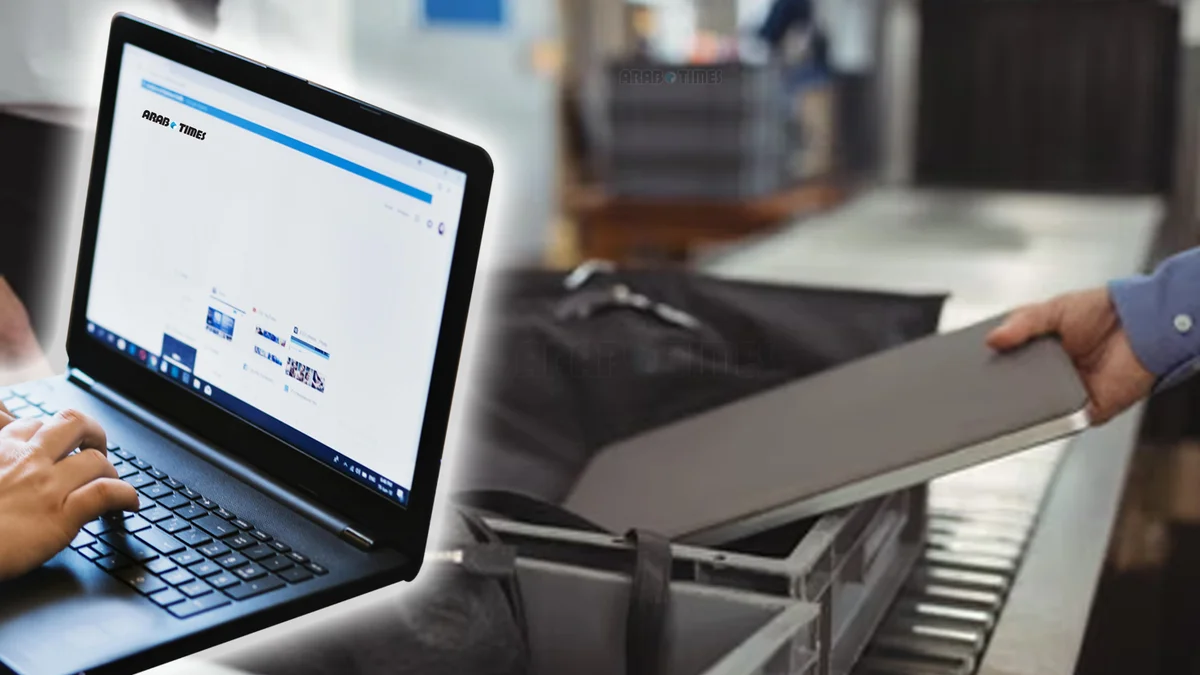06/09/2025
06/09/2025

KUWAIT CITY, Sept 6: Passengers passing through airport security may sometimes be asked to switch on their laptops, tablets, or other electronic devices. While such checks became more prominent in the early 2000s, they were strictly enforced from 2014 onward, particularly for flights to the U.S., UK, and other high-risk destinations.
At Kuwait International Airport, the power-on test has been a standard practice since 2014. Passengers are required to turn on laptops, Tablets, and large electronic devices at both the main security checkpoint and at the boarding gate. Unlike airports such as Doha’s Hamad International, Sharjah, Abu Dhabi International, or Dubai Airport, which have upgraded to 3D CT scanners and relaxed some rules. Even at Oman and Bahrain airports 'Power-on test' is rare. Kuwait continues to follow traditional TSA/UK-style protocols to mitigate risks from disguised explosives.
Kuwait's DGCA states that, before boarding your flight, you must pass through airport security, where your bags will be carefully inspected. If you are carrying electronic devices such as mobile phones, laptops, or tablets, they must be placed in separate trays as instructed by security officials. Certain items, including nail clippers, knives, scissors, and batteries, are strictly prohibited in hand luggage. Liquids such as water, soft drinks, gels, and oils are also not allowed; however, essential items like lotions or medicines may be carried if properly packed and kept under the 100 ml limit. Additionally, all metal objects such as belts, keys, pens, and wallets must go through the X-ray machine. Security is a top priority at airports, and at Terminal 4, passengers undergo three levels of checks: the first at the baggage screening before the check-in counters, the second after passport control, and the third for transit passengers.
Airport security authorities cite several reasons for requiring passengers to power on electronic devices during screening. One primary concern is the verification of authenticity: in the past, terrorists have attempted to conceal explosives inside hollowed-out laptops and other electronics, and powering on a device confirms it is a genuine, functioning unit rather than a disguised threat. Another factor is the battery requirement, as devices that fail to switch on may raise suspicion of tampering or hidden contraband within battery compartments. Additionally, enhanced checks at high-risk airports—particularly in the U.S., UK, and Middle East—form part of broader counter-terrorism protocols. Finally, limitations of X-ray scanners mean that while scanners can detect wires and batteries, they cannot always verify the authenticity of electronics, making a simple power-on test a fast and effective method for security verification.
Gulf Airports Where Power-On Tests Are Still Possible
Few Gulf airports continue to enforce power-on requirements, particularly for outbound flights to high-risk destinations:
- Dubai International Airport (DXB) – Passengers bound for the U.S., Canada, or the UK, and sometimes to Europe, are advised to keep devices charged and ready to switch on; others are not required.
- Saudi Arabia (Jeddah, Riyadh) – Security personnel may request passengers to power on devices, particularly for international flights.
- Kuwait International Airport (KWI) – Standard practice for many flights.
Gulf Airports Less Often Associated with Power-On Tests
Below airports in the region have largely phased out or rarely enforce the practice:
Below airports in the region have largely phased out or rarely enforce the practice:
- Dubai International Airport (DXB) – Recently successful trials of advanced 3D CT scanners. These state-of-the-art machines allow security personnel to analyze the contents of passengers' hand luggage without requiring them to remove laptops, tablets, or liquids exceeding 100ml. The new system is being tested across Terminals 1, 2, and 3 under Dubai Aviation Engineering Projects (DAEP)
- Abu Dhabi International Airport (AUH) – Electronics bans were lifted in 2017, and standard carry-on policies now apply.
- Hamad International Airport (DOH), Doha – Smart screening systems allow travelers to leave electronics in bags, reducing the need for power-on checks.
- King Fahd International Airport (DMM), Dammam – No recent guidance indicates that power-on tests are routinely conducted.
- Oman (Muscat International Airport – MCT) - Passengers may be asked to switch on laptops, tablets, or other electronic devices, but this is not routinely enforced for all flights. Oman has upgraded some security checkpoints, so smart screening systems reduce the need for a routine power-on test.
- Bahrain (Bahrain International Airport – BAH) - Travelers are advised to keep electronic devices charged in case security personnel request a power-on test. Like Oman, these checks are primarily for flights to high-risk destinations, such as the U.S. or the UK.
- Kuwait’s new International Airport Terminal 2 (KWI) - is currently under construction. The contract includes the supply and installation of 70 x Hi-SCAN 6040 CTiX computed tomography (CT) X-rays, which allow passengers to leave electronic devices and liquids in their bags
- Sharjah International Airport (SHJ ) - Passengers are generally not required to power on their laptops or electronic devices during security screening. The standard procedure involves removing electronics from carry-on bags and placing them in separate trays for X-ray inspection.
To avoid delays, passengers are advised to keep all electronic devices fully charged before traveling, particularly on flights to destinations with stricter screening protocols.


